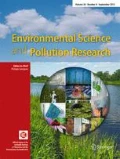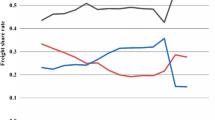Abstract
Carbon emissions in air passenger transport have become increasing serious with the rapidly development of aviation industry. Combined with a tripartite equilibrium strategy, this paper proposes a multi-level multi-objective model for an air passenger transport carbon tax setting problem (CTSP) among an international organization, an airline and passengers with the fuzzy uncertainty. The proposed model is simplified to an equivalent crisp model by a weighted sum procedure and a Karush-Kuhn-Tucker (KKT) transformation method. To solve the equivalent crisp model, a fuzzy logic controlled genetic algorithm with entropy-Bolitzmann selection (FLC-GA with EBS) is designed as an integrated solution method. Then, a numerical example is provided to demonstrate the practicality and efficiency of the optimization method. Results show that the cap tax mechanism is an important part of air passenger trans’port carbon emission mitigation and thus, it should be effectively applied to air passenger transport. These results also indicate that the proposed method can provide efficient ways of mitigating carbon emissions for air passenger transport, and therefore assist decision makers in formulating relevant strategies under multiple scenarios.





Similar content being viewed by others
References
Akhmat G, Zaman K, Shukui T et al (2014) Does energy consumption contribute to environmental pollutants? Evidence from SAARC countries. Environ Sci Pollut Res 21(9):5940–5951
Albers S, Bühne JA, Peters H (2009) Will the EU-ETS instigate airline network reconfigurations? J Air Transp Manag 15(1):1–6
Alcock I, White MP, Taylor T et al (2017) ‘Green’ on the ground but not in the air: pro-environmental attitudes are related to household behaviours but not discretionary air travel. Global Environ Chang 42:136–147
Becken S (2002) Analysing international tourist flows to estimate energy use associated with air travel. J Sustain Tour 10(2):114–131
Bieger T, Wittmer A (2006) Air transport and tourism—perspectives and challenges for destinations, airlines and governments. J Air Transp Manag 12(1):40–46
Bows A, Anderson KL (2007) Policy clash: can projected aviation growth be reconciled with the UK Government’s 60% carbon-reduction target? Transp Policy 14(2):103–110
Boyd S, Vandenberghe L (2004) Convex optimization. Cambridge University Press
Cui Q, Wei Y M, Li Y (2016) Exploring the impacts of the EU ETS emission limits on airline performance via the Dynamic Environmental DEA approach. Appl Energy 183:984–994
Filimonau V, Dickinson J, Robbins D et al (2013) The role of ‘indirect’ greenhouse gas emissions in tourism: assessing the hidden carbon impacts from a holiday package tour. Transp Res A Policy Pract 54:78–91
Fukui H, Miyoshi C (2017) The impact of aviation fuel tax on fuel consumption and carbon emissions: the case of the US airline industry. Transport Res Part D-Transport Environ 50:234–253
Gen M, Cheng RW (2000) Genetic algorithms and engineering optimization. Wiley, New York; USA
Goldberg DE (1989) Genetic algorithms in search, optimization, and machine learning
Goldberg DE, Holland JH (1988) Genetic algorithms and machine learning. Mach Learn 3(2):95–99
Hanson M (1981) On sufficiency of the Kuhn-Tucker conditions. J Math Anal Appl 80:545–550
He L, Huang GH, Lu H (2011) Greenhouse gas emissions control in integrated municipal solid waste management through mixed integer bilevel decision-making. J Hazard Mater 193:112–119
He Y, Wang L, Wang J (2012) Cap-and-trade vs. carbon taxes: a quantitative comparison from a generation expansion planning perspective. Comput Ind Eng 63(3):708–716
Hofer C, Dresner ME, Windle RJ (2010) The environmental effects of airline carbon emissions taxation in the US. Transport Res Part D-Transport Environ 15(1):37–45
International Civil Aviation Organization (ICAO) (2013) ICAO Environmental Report 2013, Aviation and Climate Change. Available from: http://cfapp.icao.int/Environmental-Report-2013/files/assets/common/downloads/ICAO_2013_Environmental_Report.pdf
Lee CY (2003) Entropy-Boltzmann selection in the genetic algorithms. IEEE Trans Syst Man Cybern Part B 33(1):138–149
Lee DS, Pitari G, Grewe V et al (2010) Transport impacts on atmosphere and climate: aviation. Atmos Environ 44(37):4678–4734
Mayor K, Tol RS (2007) The impact of the UK aviation tax on carbon dioxide emissions and visitor numbers. Transp Policy 14(6):507–513
Mayor K, Tol RS (2010) The impact of European climate change regulations on international tourist markets. Transp Res Part D: Transp Environ 15(1):26–36
Naims H (2016) Economics of carbon dioxide capture and utilizationa supply and demand perspective. Environ Sci Pollut Res 1–16
Nordhaus WD (2007) A review of the Stern review on the economics of climate change. J Econ Lit 45 (3):686–702
Ozturk I (2015) Measuring the impact of energy consumption and air quality indicators on climate change: evidence from the panel of UNFCC classified countries. Environ Sci Pollut Res 22(20):15459–15468
Pejovic T, Noland RB, Williams V et al (2008) Estimates of UK CO2 emissions from aviation using air traffic data. Clim Chang 88(3-4):367–384
Ryerson MS, Hansen M (2010) The potential of turboprops for reducing aviation fuel consumption. Transport Res Part D-Transport Environ 15(6):305–314
Sajjad F, Noreen U, Zaman K (2014) Climate change and air pollution jointly creating nightmare for tourism industry. Environ Sci Pollut Res 21(21):12403–12418
Sakawa M, Nishizaki I (2009) Cooperative and noncooperative multi-level programming. Springer, New York
Sgouridis S, Bonnefoy PA, Hansman RJ (2011) Air transportation in a carbon constrained world: long-term dynamics of policies and strategies for mitigating the carbon footprint of commercial aviation. Transp Res A Policy Pract 45(10):1077–1091
Sibdari S, Pyke DF (2014) Dynamic pricing with uncertain production cost: an alternating-move approach. Eur J Oper Res 236(1):218–228
Sinha S, Sinha SB (2002) KKT transformation approach for multi-objective multi-level linear programming problems. Eur J Oper Res 143(1):19–31
Song YH, Wang GS, Wang PY et al (1997) Environmental/economic dispatch using fuzzy logic controlled genetic algorithms. IEE Proc Gener Transm Distrib 144(4):377–382
Thompson TM, Rausch S, Saari RK et al (2014) A systems approach to evaluating the air quality co-benefits of US carbon policies. Nat Clim Chang 4(10):917–923
Wensveen JG, Leick R (2009) The long-haul low-cost carrier: a unique business model. J Air Transp Manag 15(3):127–133
Xu JP, Yao LM (2011) Random-like multiple objective decision making. Springer-Verlag, Berlin
Xu JP, Zhou XY (2011) Fuzzy-like multiple objective decision making. Springer-Verlag, Heidelberg
Xu JP, Yao LM, Lu Y (2014) Innovative approaches towards low carbon economics. Springer-Verlag, Heidelberg
Xu JP, Yang X, Tao ZM (2015) A tripartite equilibrium for carbon emission allowance allocation in the power-supply industry. Energy Policy 82:62–80
Xu JP, Qiu R, Lv CW (2016) Carbon emission allowance allocation with cap and trade mechanism in air passenger transport. J Clean Prod 131:308–320
Yao LM, Xu JP, Zhang MX et al (2016) Waste load equilibrium allocation: a soft path for coping with deteriorating water systems. Environ Sci Pollut Res 1–21
Yun Y, Gen M (2016) Performance analysis of adaptive genetic algorithms with fuzzy logic and heuristics. Fuzzy Optim Decis Making 2(2):161–175
Funding
This research is supported by State Key Development Program of (for) Basic Research of China (973 Program, Grant No. 2011CB201200), the Programs of National Natural Science Foundation of China (Grant No. 71401114 and No. 71671118), the Major Bidding Program of National Social Science Foundation of China (Grant No. 12&ZD217), and China Scholarship Council (CSC) (Grant No. 201606240155).
Author information
Authors and Affiliations
Corresponding authors
Additional information
Responsible Editor: Philippe Garrigues
Appendix
Appendix
Rights and permissions
About this article
Cite this article
Xu, J., Qiu, R., Tao, Z. et al. Tripartite equilibrium strategy for a carbon tax setting problem in air passenger transport. Environ Sci Pollut Res 25, 8512–8531 (2018). https://doi.org/10.1007/s11356-017-1163-z
Received:
Accepted:
Published:
Issue Date:
DOI: https://doi.org/10.1007/s11356-017-1163-z




